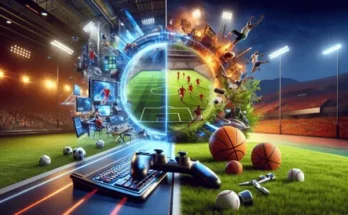Once dismissed as just a pastime for kids or a hobby for teens, games have emerged as a global cultural force, deeply woven into the fabric of entertainment, education, and even professional careers. Whether it’s the high-octane thrills of competitive esports or the relaxing charm of a mobile puzzle game, the gaming universe is massive, varied, and constantly evolving.
Games today are more than just play—they’re a form of storytelling, community building, mental stimulation, and in many cases, a legitimate profession. So, what are all these types of games people keep talking about? How much time should we be giving to them? And can playing games ever turn into a real job? Let’s dive deep and explore.
The Many Faces of Gaming:
-
Video Games
Video games are arguably the most recognizable form of modern gaming. They span across platforms—PCs, consoles like PlayStation or Xbox, and increasingly, mobile phones. From open-world adventures to fast-paced shooters, simulation games, role-playing games (RPGs), and story-driven experiences, the variety is nearly endless.
What makes video games so compelling is their ability to transport players into entirely new worlds. Players are not just watching stories unfold—they are part of the story, influencing it with their choices, skills, and actions. This level of interactivity has turned gaming into the leading form of entertainment worldwide, surpassing even the movie industry in revenue.
-
Mobile Games
Thanks to smartphones, gaming is no longer confined to dedicated devices. Mobile games have made it possible to play anytime, anywhere. Games like Candy Crush, Clash Royale, and Among Us have defined a whole new era of casual gaming.
Mobile games are often quick to play, simple to understand, and designed for short bursts of engagement. They appeal to a broader audience and often include social features, leaderboards, or in-game messaging that enhance their stickiness.
-
Board Games and Card Games
Long before screens took over, gaming happened around a table with dice, tokens, and cards. Board games and card games have seen a powerful resurgence in recent years, with titles like Catan, Ticket to Ride, and Exploding Kittens drawing massive fan bases.
These games bring people together physically and encourage face-to-face interaction. Whether cooperative or competitive, board games are an essential reminder that some of the best gaming experiences happen offline.
-
Sports and Physical Games
Traditional games like football, tennis, and tag may not involve electronics, but they share many of the same principles: strategy, skill, competition, and fun. They are an important category of games, especially for physical development, social bonding, and mental discipline.
In many ways, physical sports laid the groundwork for the competitive nature of digital esports. Both demand training, tactics, and teamwork.
-
Educational and Simulation Games
Not all games are about entertainment. Many are designed to educate or simulate real-world activities. Flight simulators, business strategy games, and historical role-plays blend learning with engagement. Educational games, especially for kids, help in developing cognitive skills, language, math, and logic in an enjoyable format.
These types of games prove that play can be purposeful.
How Much Time Should One Spend on Games?
-
The Balance Between Play and Life
Gaming, like any hobby, is best enjoyed in moderation. The ideal amount of time to spend on games varies based on age, lifestyle, and purpose. For casual players, 1-2 hours a day can offer a great escape or relaxation after work or school. For competitive players or aspiring pros, 3-6 hours of structured practice may be needed.
However, problems arise when gaming interferes with real-life responsibilities—like studies, sleep, relationships, or physical health. That’s when the joy of gaming can begin to turn into a burden.
The key is mindful gaming. Set boundaries. Use timers if necessary. Take breaks. And remember that gaming is just one of many enriching activities life has to offer.
-
For Kids and Teens
Younger gamers should ideally play under some supervision, with a balanced mix of outdoor play and screen time. Parents can be involved in choosing age-appropriate games, setting time limits, and even playing together to turn gaming into a shared family experience.
Can Gaming Be a Career?
-
The Rise of Esports and Streaming
Not long ago, telling someone you wanted to become a “pro gamer” might’ve raised eyebrows. Today, esports is a multi-billion-dollar industry with global tournaments, sponsors, teams, and fans. Games like League of Legends, Counter-Strike, Dota 2, and Fortnite offer prize pools bigger than many traditional sports events.
Beyond playing professionally, there’s an entire ecosystem of careers surrounding gaming. Streamers and content creators on platforms like Twitch and YouTube can build massive followings and earn through subscriptions, donations, sponsorships, and merchandise.
Shoutcasters, coaches, analysts, graphic designers, developers, and event managers—all play a part in the industry. If you’re passionate about games, there’s likely a career path that aligns with your skills.
-
Game Development
Creating games is an art and a science. It involves writers, artists, coders, musicians, testers, and project managers. Game development can be one of the most collaborative and creatively satisfying tech careers out there.
Aspiring developers can start small—learning coding through platforms like Unity or Unreal Engine and building indie games. Game jams and open-source communities provide excellent opportunities for collaboration and exposure.
-
The Reality Check
That said, the competition is fierce. Not everyone will become a top-tier streamer or esports champion. Just like becoming a professional athlete, success in gaming requires talent, discipline, resilience, and often, a bit of luck.
For those considering gaming as a career, it’s wise to have a Plan B, invest in education, and remain flexible. Skills learned through gaming—teamwork, problem-solving, critical thinking—can be applied to many industries.
The Social and Psychological Side of Gaming:
-
Community and Connection
Games are no longer solitary pursuits. Online multiplayer games allow people to connect, collaborate, and form friendships across continents. From guilds in MMORPGs to co-op missions in action games, there’s a real sense of community that fosters teamwork and communication.
For many, games are not just entertainment—they’re a place to belong.
-
Emotional and Cognitive Impact
Research shows that games can improve cognitive functions like memory, reflexes, spatial awareness, and even emotional resilience. Problem-solving games encourage strategic thinking. Story-rich games can foster empathy. Competitive games build perseverance.
However, excessive gaming or toxic environments can also lead to stress, anxiety, and burnout. It’s important to curate what we play, how long we play, and whom we play with.
Conclusion:
Games are not just entertainment—they are a reflection of human imagination, skill, and culture. They teach us, challenge us, connect us, and sometimes even reward us. But like all powerful tools, how we use them determines their impact.
Whether you’re a casual gamer unwinding after a long day, a parent navigating your child’s screen time, or an aspiring e-sports pro grinding toward a dream, understanding the world of games helps you play smarter—not just harder.
In the end, life is the biggest game of all. And like any game, it’s about balance, learning from losses, celebrating wins, and most importantly—having fun along the way.




